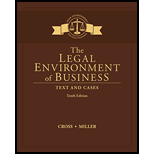
Case summary:Company M manufactures and sells over-the-counter pharmaceutical products. Its main brand Z accounts for almost 70 percent sale of the company. The reports about loss of sense of smell by the customer are received by company M. There were four product liability suits registered against company M. Company did not reveal the information received by the report. Person J and other investors filed a suit against M claiming the omission of material information by the company.
To explain:The standard for materiality in the claim filed by the investors.
Case summary:Company M manufactures and sells over-the-counter pharmaceutical products. Its main brand Z accounts for almost 70 percent sale of the company. The reports about loss of sense of smell by the customer are received by company M. There were four product liability suits registered against company M. Company did not reveal the information received by the report. Person J and other investors filed a suit against M claiming the omission of material information by the company.
To explain:The validity of claim made by the person J.
Want to see the full answer?
Check out a sample textbook solution
Chapter 28 Solutions
The Legal Environment of Business: Text and Cases (MindTap Course List)
- Accounting problemarrow_forwardSolve with explanation and accounting questionarrow_forwardQuestion 4 MGM12026 Production and Operations Management semester il 2024 A company operates a manufacturing plant that produces two products, A and B. The plant has the following capacity data: . . Design Capacity: 15,000 machine hours per month Effective Capacity: 12,000 machine hours per month Actual Output (Utilized Capacity): 10,000 machine hours per month Additionally, the plant produces Product A and Product B, with the following production data: Product Demand (Units) Processing Time Contribution Margin ($ (hours per unit) per unit) A 3,000 2.5 40 B 4,000 1.5 30 a. Calculate the plant's i. Capacity Utilization [3 marks] ii. Effective Capacity Utilization [3 marks] iii. Efficiency. Interpret the results. [3 marks] b. Compute the total machine hours required to meet full demand for both products. [5 marks] c. Determine whether the plant has sufficient capacity to meet full demand. If not, calculate the shortfall in machine hours. [3 marks] d. Using the contribution margin per…arrow_forward
 BUSN 11 Introduction to Business Student EditionBusinessISBN:9781337407137Author:KellyPublisher:Cengage Learning
BUSN 11 Introduction to Business Student EditionBusinessISBN:9781337407137Author:KellyPublisher:Cengage Learning Essentials of Business Communication (MindTap Cou...BusinessISBN:9781337386494Author:Mary Ellen Guffey, Dana LoewyPublisher:Cengage Learning
Essentials of Business Communication (MindTap Cou...BusinessISBN:9781337386494Author:Mary Ellen Guffey, Dana LoewyPublisher:Cengage Learning Accounting Information Systems (14th Edition)BusinessISBN:9780134474021Author:Marshall B. Romney, Paul J. SteinbartPublisher:PEARSON
Accounting Information Systems (14th Edition)BusinessISBN:9780134474021Author:Marshall B. Romney, Paul J. SteinbartPublisher:PEARSON
 International Business: Competing in the Global M...BusinessISBN:9781259929441Author:Charles W. L. Hill Dr, G. Tomas M. HultPublisher:McGraw-Hill Education
International Business: Competing in the Global M...BusinessISBN:9781259929441Author:Charles W. L. Hill Dr, G. Tomas M. HultPublisher:McGraw-Hill Education





